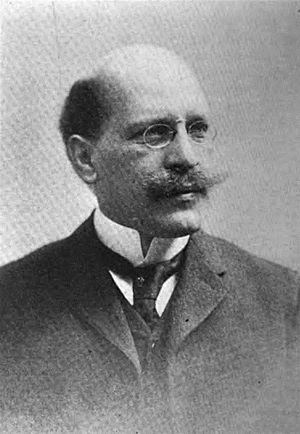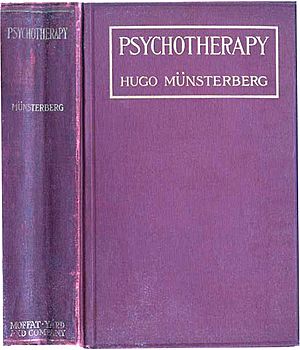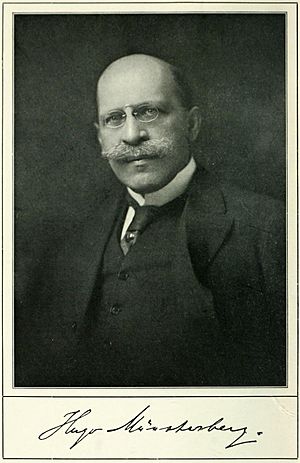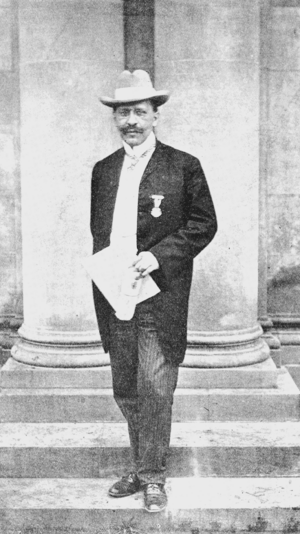Hugo Münsterberg facts for kids
Quick facts for kids
Hugo Münsterberg
|
|
|---|---|

Hugo Münsterberg
|
|
| Born | June 1, 1863 |
| Died | December 16, 1916 (aged 53) Cambridge, Massachusetts, U.S.
|
| Nationality | German, American |
| Citizenship | American |
| Known for | Applied psychology Formalist film theory |
| Scientific career | |
| Fields | Psychology |
| Thesis | Die Lehre von der natürlichen Anpassung in ihrer Entwicklung, Anwendung und Bedeutung (1885) |
| Doctoral advisor | Wilhelm Wundt |
| Doctoral students | Edwin Holt |
| Other notable students | Morris Raphael Cohen, Mary Whiton Calkins, Richard M. Elliott |
| Influences | Frederick Winslow Taylor |
| Signature | |
Hugo Münsterberg (June 1, 1863 – December 16, 1916) was a famous German-American psychologist. He was a leader in a field called applied psychology. This means he used psychological ideas to solve real-world problems.
He applied his knowledge to many areas. These included business, law, medicine, and education. During World War I, Münsterberg faced a tough time. He felt loyal to both the United States and his home country, Germany. He often defended Germany's actions, which caused strong reactions.
Contents
Biography
Early Life and Interests
Hugo Münsterberg was born in 1863 in Danzig, a port city in what is now Poland. His family loved art, music, and literature. Hugo was encouraged to explore these interests.
His mother died when he was 12. This made him a more serious young man. His father passed away when Hugo was 17.
Education and Career Path
Hugo Münsterberg had many interests as a young person. He loved art, literature, music, and languages. In 1883, he started studying at the University of Leipzig. There, he became very interested in psychology after hearing a lecture by Wilhelm Wundt.
Münsterberg became Wundt's research assistant. He earned his PhD in psychology in 1885 at just 22 years old. He then got his medical degree in 1887. He also started his own psychology lab. He published many papers on topics like memory and learning. In 1887, he married Selma Oppler.
In 1892, a famous American psychologist, William James, invited Münsterberg to Harvard University. He was asked to lead the psychology lab for three years. At first, Münsterberg did not speak English. But he learned quickly. His classes became very popular. He also guided many graduate students, including Mary Whiton Calkins.
In 1895, he went back to Germany. But he couldn't find the right job there. So, he asked James for his old position back at Harvard. He returned to Harvard in 1897.
Münsterberg's career at Harvard was very successful. He became president of the American Psychological Association in 1898. He was also involved in many other important groups. He worked hard to improve relations between the United States and Germany. He wrote books and articles to help people in both countries understand each other better.
As World War I approached, Münsterberg's views caused controversy. He supported German policies. This made some people in the US suspicious of him. Some even thought he might be a spy. Despite these challenges, he stayed at Harvard. He continued teaching until his sudden death in 1916.
Scholarship
Applying Psychology to Real Life
Münsterberg believed psychology should help solve real-world problems. This was different from his teacher, Wundt. Wundt thought psychology should be a "pure science." Münsterberg wanted to use psychological ideas in practical ways. He believed that psychologists should find information that could be used in everyday life.
Psychology in Law (Forensic Psychology)
Münsterberg was a pioneer in forensic psychology. This field applies psychology to legal issues. In 1908, he published a book called On the Witness Stand. In this book, he discussed how psychology could help in court cases. He looked at how different psychological factors could affect a trial.
He explained why eyewitness testimony might not always be reliable. He showed that people's memories can be easily mistaken. He said that two people seeing the same event might remember it very differently. This is because memory can be affected by what we expect or what we are told.
Münsterberg also wrote about "Untrue Confessions." He worried that people might confess to crimes they didn't commit. He thought this could happen due to certain pressures.
He did experiments with his students. He showed them a card with black dots for only five seconds. Then he asked them to count the dots. Even careful observers gave very different answers. This showed him that people's observations are not always perfect. He warned against trusting eyewitnesses too much. He also discussed how police methods could sometimes lead to false confessions.
Psychology in Health (Clinical Psychology)
Münsterberg also applied psychology to help people with mental health issues. He believed that some mental illnesses had physical causes in the brain. He tried to understand why people behaved in unusual ways.
He helped his patients by making them believe they could get better. He also used a method called "reciprocal antagonism." This meant strengthening thoughts that were opposite to the problem behavior. He did not charge his patients for his help.
Psychology in Business (Industrial Psychology)
Münsterberg admired Frederick Winslow Taylor, who studied how to make work more efficient. Münsterberg wanted to create a new science. This science would connect psychology with business. His books, Vocation and Learning (1912) and Psychology and Industrial Efficiency (1913), helped start industrial psychology.
He explored many topics in this field. These included:
- Hiring the right people: How to find workers whose personalities and skills fit certain jobs best. This could help people be more motivated and stay in their jobs longer.
- Improving work efficiency: How to make work easier and more productive.
- Marketing and advertising: How psychology could be used to sell products.
In Psychology and Industrial Efficiency, Münsterberg asked three main questions: 1. How can we find the best person for a job? 2. How can we help every person do their best work? 3. How can businesses influence people's minds for success?
He believed that matching the right person to the right job was key. He thought that traditional ways of hiring, like relying on education or past jobs, were not enough. He wanted to use scientific tests to find the best fit. He noted that young people often don't know what job is right for them. He also saw that changing jobs was common in America.
Münsterberg believed that vocational guidance should be scientific. He looked at early career guidance programs. He thought these programs needed more exact, scientific research. He wanted to use psychological experiments to help people find the best jobs.
He also studied how the work environment affects employees. He looked at how to avoid boredom in repetitive tasks. He also studied attention and tiredness at work.
Finally, he explored how companies could sell more. He looked at how to make advertisements effective. He also studied the psychology of buying and selling.
Women and Education
Münsterberg believed that women should receive higher education. However, he felt that very advanced studies might be too demanding for them. He also thought women should not serve on juries. He believed they were "incapable of rational deliberation."
Contributions to Film Theory
Münsterberg's book The Photoplay: A Psychological Study is considered one of the first books on film theory. It explored how movies affect our minds.
Spiritualism
Münsterberg believed in God and life after death. But he was strongly against parapsychology. This is the study of paranormal and psychic events. He was known for exposing fake psychics.
One famous case involved a medium named Eusapia Palladino. Münsterberg showed how she used tricks to make it seem like objects were floating. He found she used a hidden person under a table. He also discovered she used a rubber bulb to create air jets to move curtains. Even after being exposed, Palladino continued her acts.
Students
Münsterberg was a teacher to William Moulton Marston. Marston later became famous for creating the comic book character Wonder Woman.
Works
- Books
- Die Willenshandlung (1888)
- Beiträge zur experimentellen Psychologie (1889–92) Vol. 1, Vol. 2, Vol. 3, Vol. 4
- Psychology and Life (1899)
- Grundzüge der Psychologie (1900)
- American Traits from the Point of View of A German (1901)
- Die Amerikaner (1904)
- The Americans (1904)
- The Principles of Art Education (1905)
- The Eternal Life (1905)
- Science and Idealism (1906)
- On the Witness Stand: Essays on Psychology and Crime (1908)
- Aus Deutsch-Amerika (1908)
- The Eternal Values (1909)
- Psychology and the Teacher (1909, 1916)
- Psychotherapy (1909)
- American Problems from the Point of View of a Psychologist (1910)
- Vocation and Learning (1912)
- Psychology and Industrial Efficiency (1913)
- American Patriotism And Other Social Studies (1913)
- Psychology and Social Sanity (1914)
- Grundzüge der Psychotechnic (1914)
- Psychology, General and Applied (1914, textbook)
- The War and America (1915)
- Business Psychology (1915, textbook for La Salle Extension University, Chicago)
- Tomorrow (1916)
- The Photoplay. A psychological study (1916)
- Articles
- Münsterberg, H. (1899). Psychology and Mysticism. Atlantic Monthly 83: 67–85.
- Münsterberg, H. (1910). My Friends the Spiritualists: Some Theories and Conclusions Concerning Eusapia Palladino. Metropolitan Magazine 31: 559–572.
- Münsterberg, H. (1907). Communicating with the Dead. New-York Tribune. November 3.
- Münsterberg, H. (1913). The Case of Beulah Miller: An Investigation of the New Psychical Mystery. The Metropolitan 38: 16–62.
See also
 In Spanish: Hugo Münsterberg para niños
In Spanish: Hugo Münsterberg para niños
- Invisible auditor
 | Madam C. J. Walker |
 | Janet Emerson Bashen |
 | Annie Turnbo Malone |
 | Maggie L. Walker |




